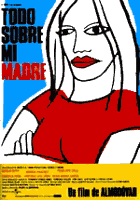

| M O V I E R E V I E W B Y D A V I D N G |
 | | Cecilia Roth with Antonia San Juan. |
All About My Mother is a frenzied meditation on womanhood. Directed and written by Pedro Almodovar, it throws everything the filmmaker knows about the opposite sex (which is a lot) into a jumbled, comic heap. Mother, daughter, wife, grandmother, sister, nun, lesbian, prostitute, transsexual: they all collide playfully with each other on a canvas that is a size too small for their burgeoning personalities. A sunny and optimistic comedy, All About My Mother celebrates the roles women must play in life.
To construct a successful movie around such a vast subject as womanhood requires attention to detail, and Almodovar must have realized this early in the creative process. He constructs his women from the inside out, starting with extremely specific episodes in their lives, and then connects their stories to create an intersecting network of angst and humor. By the end, each character has taken her own place in Almodovar’s extended family of women.
 | | | Spanish movie poster for All About My Mother. |
At the center is Manuela, a 38-year-old single mother living comfortably in Madrid and working as a nurse at the organ transplant unit of a hospital. At home, she watches old American movies with her son and, when encouraged, reminisces about her days as a stage actress. Played with tremendous understatement by Cecilia Roth, she is a private woman who keeps her personality tucked neatly under a surface of efficient professionalism. When unspeakable tragedy changes her life, she pushes her personality deeper down until what we see on screen is a Manuela twice removed from herself. In certain scenes, she is on the brink of tears, but she manages to stay just this side of collapse by focusing completely on the now.
Manuela is the movie’s anomaly, however. Almodovar surrounds her with a sea of Fellini-esque grande dames who are as open as Manuela is shut, and who seem to wear their personalities like designer clothes. There is Agrado (Antonia San Juan), an old friend and aging transsexual. "I used to be a truck driver," she tells a perfect stranger. "Then I got a pair of tits and became a whore." Manuela and Agrado befriend Rosa (Penelope Cruz), a young nun, whose repressed beauty suggests a deep secret. Rosa’s mother (Rosa Maria Sarda) is a domineering woman for whom wealth has brought boredom and who tries hard to care without being intrusive. Later, Manuela befriends Huma (Marisa Paredes), a lesbian actress who is playing Blanche in a local production of A Streetcar Named Desire.
 | | Cecilia Roth with Eloy Azorín. |
Almodovar pays special attention to how theatre and drama define his characters. He includes excerpts from movies and plays at strategic points throughout his story. If being a woman means assuming a host of different roles in life, he seems to say, then dramatic art is a woman’s natural habitat. Even the title All About My Mother comes from All About Eve which is itself a movie about the acting profession. As Manuela grows closer to her extended family, she is simultaneously drawn back in to the theatrical community. When called on to play Stella during a crisis, she tells Huma that she has known the part for years. It has become part of her, like being a mother. "While men can lie better," Almodovar explains, "women have a greater capacity to play-act."
Almodovar isn’t interested in delving into any particular female role. He’s too impatient for that. He prefers to move incessantly between them, as if imitating a woman’s ability to be a daughter at one moment and mother the next. The effect can be frustrating when the women cease to sound real and turn into overwrought symbols of their gender. At these moments, the movie feels manipulative and shallow. But by sacrificing depth, Almodovar gives himself latitude to cram more women into his bustling panorama. He is really exploring all women, with each character comprising a part of an uber-feminine identity.
 | | | Antonia San Juan and Carlos Lozano. |
Because All About My Mother is a meditation rather than an analysis, Almodovar avoids drawing conclusions about his characters or about women in general. He is a voyeur, albeit a highly stylized one. He brings us in close to his subjects, but not close enough to let us pry into their minds. It’s an anti-intellectual approach to character development. It’s also unemotional. Almodovar’s screenplay is deliberately absurdist, contriving situations that could never happen in reality, making the characters’ emotional reactions to them equally abstract. And yet, Almodovar’s women are fiercely alive. They are vibrant, dynamic, and up to the challenge of transforming Almodovar’s surrealistic vision into an off-beat kind of verisimilitude.
All About My Mother is the most unconventional story about being a woman since The Crying Game. But because its tone is whimsical, bordering on farcical, it never feels like a gender lesson. Almodovar has once again rolled his duties as a serious filmmaker into his comedic sensibilities, creating a work that informs through laughter. Feminists take heed: here is a movie about women, dedicated to women, starring only women, and created by a man.
   
[rating: 3½ of 4 stars]
|
|




